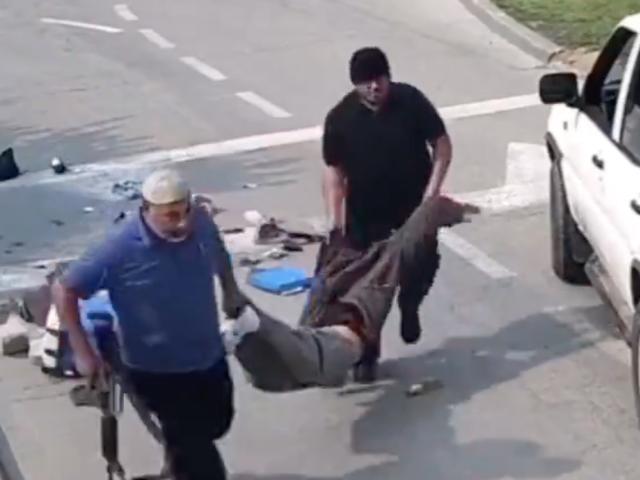In a startling revelation that underscores the complex entanglements in the Israel-Palestine conflict, a video emerging from the tragic events of October 7, attributed to the Hamas terrorist group, ostensibly captures a United Nations Relief and Works Agency (UNRWA) employee engaging in the abduction of an Israeli citizen's remains. This incident unfolded amidst a horrifying assault that left a deep scar on southern Israel, marking a day of unparalleled violence and loss.
The individual implicated in this act was later identified by Israel's Defense Minister, Yoav Gallant, as Faisal Ali Mussalem al-Naami, a social worker affiliated with UNRWA in the Gaza Strip. The footage, which gained public attention through its initial dissemination by the "South First Responders" Telegram channel, reveals a chilling scene just days following the Hamas-led incursion—a meticulously orchestrated attack that witnessed around 3,000 terrorists infiltrating Israel from Gaza, employing a multi-faceted strategy involving land, air, and sea assaults. This operation not only claimed the lives of approximately 1,200 individuals but also led to the capture of 253 hostages, spanning all ages and predominantly civilians, under the guise of a massive rocket barrage targeting Israeli towns and cities.
Israel has revealed that the man seen here wearing black - who abducted the body of an Israeli from Kibbutz Be'eri on October 7 - is an @UNRWA employee. pic.twitter.com/Xcr3O83kqT
— Aviva Klompas (@AvivaKlompas) February 17, 2024
The video in question shows a white SUV maneuvering into Kibbutz Be’eri, one of the localities that bore the brunt of the October 7 onslaught. As the vehicle halts near three lifeless bodies adjacent to an overturned picnic cooler, two men emerge—one armed with a rifle, and the other, identified as al-Naami, dressed in black. They proceed to lift one of the bodies from the ground, forcibly placing it into the vehicle before hastily retreating from the scene.
Defense Minister Gallant, in a briefing with the international press, disclosed the involvement of 12 UNRWA staff members, including al-Naami, in the massacre, with allegations extending to another 30 staff members' participation in the attacks. This revelation was accompanied by a visual representation of the video, further intensifying scrutiny towards UNRWA.
Dear Americans,
— Marina Medvin 🇺🇸 (@MarinaMedvin) February 17, 2024
Here are our tax dollars at work. Here is a video of a Palestinian UNRWA employee kidnapping a Jew out of Israel on October 7.
Our government funds terrorism by funding UNRWA.pic.twitter.com/vkJ6O6VJhq
In response to these grave allegations, UNRWA spokesperson Jonathan Fowler expressed the agency's limitations in verifying the authenticity of the footage or the identities involved, citing the absence of concrete evidence from Israeli authorities. Nonetheless, he acknowledged an ongoing investigation by the United Nations' highest investigative bodies and called upon any entity with relevant information to contribute to the inquiry, aiming to facilitate a thorough and transparent examination.
The ramifications of these allegations have been profound, with several major donors, including the United States and various European countries, suspending their financial aid to UNRWA. This decision reflects growing concerns over the agency's integrity and its potential exploitation by terrorist factions. Israel's critique of the investigation's scope as overly vague highlights a persistent fear of terrorist groups leveraging humanitarian organizations for their agendas.
More than 30 UNRWA employees actively participated in October 7 jihad massacre! Data, 12% of the 13,000 UNRWA employees are connected to terrorist organizations in Gaza, 1,468 of the employees are even active in them. UN IS NO GOOD!
— @Investigator_50 (@Investigator_50) February 18, 2024
More info on the linkhttps://t.co/fYz5QCJXBh pic.twitter.com/GAOUedYLY7
Israel's stance on UNRWA has been further validated by revelations of Hamas utilizing UN facilities for militaristic purposes, including the construction of an extensive underground network. An exposed operations center beneath UNRWA's Gaza City headquarters has become a focal point of these accusations, raising alarm over Hamas's infiltration and manipulation of international aid mechanisms.
The disclosure by Minister Gallant that a significant portion of UNRWA's workforce in Gaza may harbor affiliations with terrorist organizations like Hamas and Palestinian Islamic Jihad has amplified calls for the agency's dissolution. With several donor nations freezing their contributions, there looms a crisis that threatens the continuation of UNRWA's operations, which are critical for the sustenance of millions in Gaza amid the ongoing conflict.
This is an @unrwa employee named Faisal Al Naami
— David Collier (@mishtal) February 17, 2024
This image is from October 7. It was taken in Israel - on Kibbutz Be'eri.
When this UNRWA worker kidnapped Israelis.
Yes you read that right.
There is no way back for UNRWA. Hamas is part of UNRWA and UNRWA is part of Hamas. pic.twitter.com/ZIqk3Q2Nop
This incident not only casts a shadow over UNRWA's role in the region but also challenges the international community to reassess its approach to providing aid and support in conflict zones, ensuring that humanitarian efforts do not inadvertently bolster the capabilities of terrorist entities.


